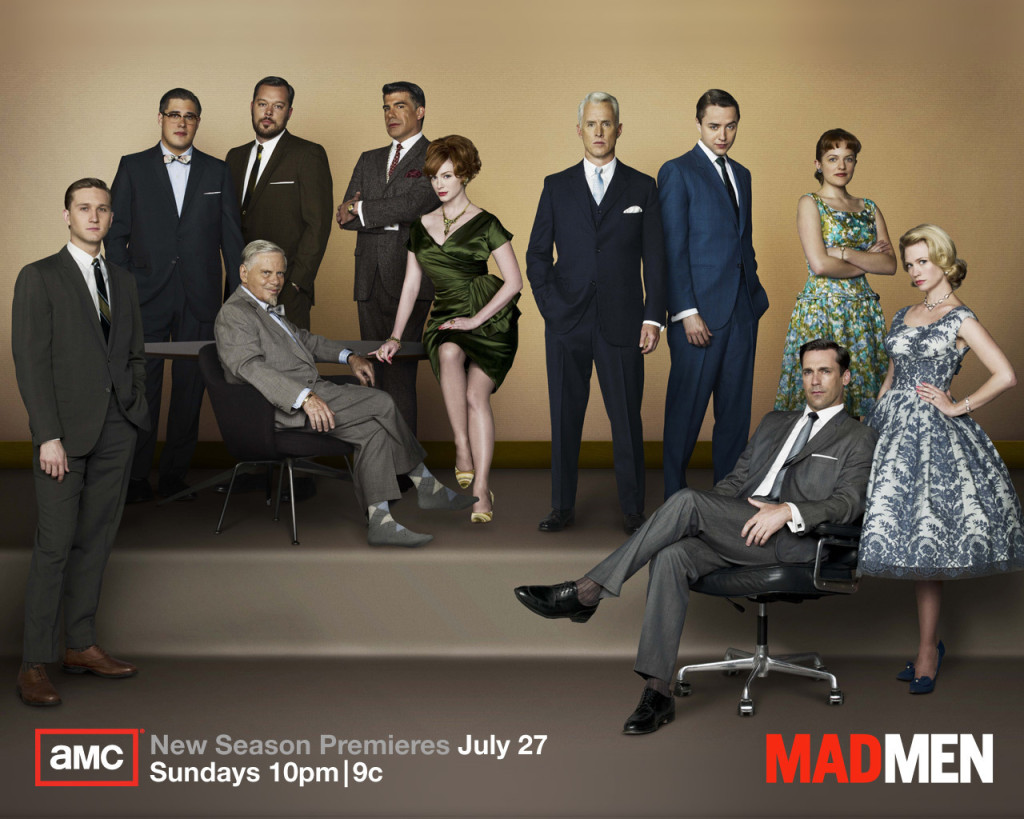Alex:
One of the most consistent qualities of Mad Men is how deftly it weaves its characters and their story into the larger historical narrative of the 1960’s. I remember when the series debuted there was some worry that the narrative might developed what I’ll call Forrest Gump Syndrome: the tendency to artlessly insert the characters into gigantic historical events. Maybe I just play Assassin’s Creed too much, but that type of story is a dark and dangerous hole from which no compelling story can emerge. It asks too much of the viewers’ suspension of disbelief and often robs the characters of their agency within the narrative. So it’s always a welcome relief to watch Mad Men and revel in how well it handles history. The approach is usually two-pronged, and I think season two gives us solid examples of each.
The first, and more subtle way, that Mad Men works in history is the subtle shifts of culture that occur around the characters and help motivate them. Look, for example, at how Peggy is treated by her family and co-workers in season two. At home, she faces her mother’s overbearing doubts and her sister’s simmering rage. The former sees her daughter as someone running away from the “proper” life for a good Catholic girl from Brooklyn, i.e. getting married and having kids. She acts like hectoring Peggy will bring her back into line. The latter eventually boils over with anger at how Peggy slept with a married man, had his child out of wedlock, and then gave the baby away. She resents the freedom (or irresponsibility) that Peggy has fought for. In both cases, the regressive values of Peggy’s family serves to subtly drive her more and more towards the bright lights of Manhattan.
That’s not to say that Mad Men avoids the big moments of history. The climax of season two takes place with the Cuban Missile Crisis taking place in the background. In the background is the pertinent part on this show, too. Humanity hovered within a whisper of annihilation in October 1962, which rightly puts everyone on the show in a state of simmering panic and fear. But that still only serves to drive the show’s main narrative. Sterling Cooper is sold to a British firm, Don’s inter-office rival is fired, and the Draper’s marriage is buffeted by ever-more adultery, absence, and new children during the Crisis. History hangs above everyone’s head like an annihilating angel here, but their lives don’t stop. At least not yet.
Becky:
One of the biggest things that sticks out to me in the second season is the continuing theme of trying on different roles in the characters’ lives. Much of the first season revolves around setting up the background history, interests, and personalities of the characters. In season two, they begin to branch out and try on different personas to see if it will bring them happiness. It works out for some people, less so for others, and some completely drop the changed lifestyles by the end of the season.
In the first season, Peggy is trying to balance dating and work. By the second season, she drops nearly all of her interest in men. She focuses on her career completely and only briefly goes on one date that doesn’t go as expected. She did not find happiness in the first season, so she is stops focusing on the part of her life that isn’t bringing her happiness.
Joan tries on the persona of an engaged woman. As she sees other women rising above her, in the home sphere and at work, she feels that she needs to move on too. She gets engaged to a seemingly perfect man and is going to leave the company once she gets married. She is attempting to find fulfillment somewhere else than her workplace since she has progressed as far as she can there. Joan sticks with this role, and it continues for many seasons, even though it doesn’t bring her the fulfillment that she is looking for.
Betty throws her husband out of the house when she finds out that he has been cheating. She has previously looked down on divorced women, but now she wants to see what that life is like. She wants to know if her life could be better divorced, or putting up with a cheating husband. Eventually she gives up on this idea and accepts Don back into their home.
Don disappears on a trip to California with people he has just met. On this same trip, he visits a woman from his past and thinks about just never going back to New York City. His unhappiness with the life he built in New York leads him to look for solace as a different person on the West Coast. Don is probably the character who most easily can change his persona. On this trip, he cavorts with a group of nomads, forgetting all about his other life. He does eventually change his mind about staying in California, but he stays there for nearly a month in his “new” life.
Roger is unhappy in his marriage also, and he decides to divorce his wife to marry a secretary in the office. Instead of playing the role of philandering husband he embodied in the first season, he decides to give all of it up, including a large sum of money on the divorce, to marry his mistress. In the second season, this new marriage bring happiness and vigor to Roger, even though this happiness will be short lived.
All of these characters will go through many more changes in outlook and ambition over the series’ run, but it is in season two where they first start to stretch beyond their opening personas. No one is static on this show, but neither can anyone exactly say where they are going.





